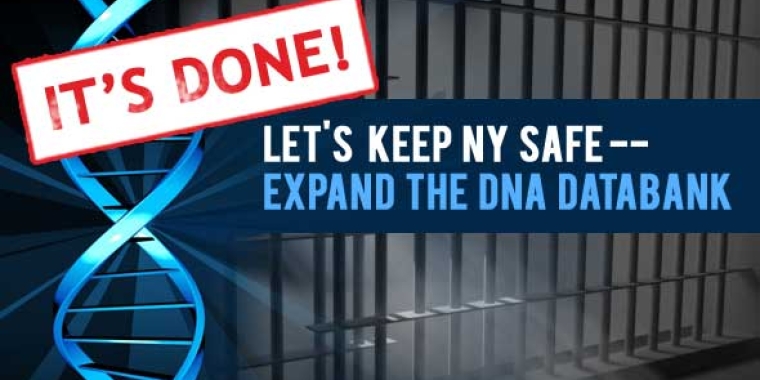
Senator Farley: Senate, Assembly & Governor Join Forces to Expand Dna Databank
Hugh T. Farley
March 15, 2012
-
ISSUE:
- Crime

State Senator Hugh T. Farley (R, C, I – Schenectady) today announced that the State Senate has voted to approve legislation that will implement the largest expansion of the State’s DNA databank since it was first created in 1994.
The databank expansion, which has been agreed to by Governor Andrew Cuomo and the State Assembly, will help close thousands of unsolved cases, bring justice to crime victims, and help prevent dangerous criminals from committing additional crimes.
“In stark contrast to the dysfunction in Washington D.C., we are once again showing just how much can be accomplished when New Yorkers work together toward a common goal. This landmark legislation will help close thousands of unsolved cases, provide justice to crime victims and help prevent future crimes from taking place,” the Senator said.
The Senate Republican Majority has led the effort to expand the databank, garnering strong public backing for the proposal through a series of on-line petitions and public events. Several thousand citizens from communities across the state signed on in support of the measure.
“This is a huge victory for all New Yorkers concerned about protecting our communities and keeping our loved ones safe and free from harm. By dramatically expanding the DNA databank, we are providing police and district attorneys with a powerful tool to solve crimes, prosecute sexual predators, and keep dangerous criminals off our streets,” the Senator added.
The Senate previously approved a DNA databank expansion bill last year with the strong support of district attorneys and crime victims’ advocates from throughout the state. Governor Andrew Cuomo also included a similar measure as part of his 2012 Executive Budget, and the Senate passed a bill in January that mirrored the his proposal.
The new legislation requires anyone convicted of a felony or penal law misdemeanor to provide a DNA sample -- dramatically expanding the information pool used by law enforcement and prosecutors.
Since its inception, the State’s DNA databank has transformed criminal investigations and prosecutions to make them more accurate and effective, in addition to helping exonerate the innocent.
However, up to this point DNA has only been collected from fewer than half of convicted criminals because the previous law did not include certain crimes. This hampered the ability of law enforcement to solve crimes, and enabled some criminals to remain free to commit additional acts of violence.
Share this Article or Press Release
Newsroom
Go to NewsroomSenator Farley Chats With Students
November 17, 2016

Gloversville Students Meet With Senator Farley
November 17, 2016

Senator Farley Salutes Student Senators
November 16, 2016

